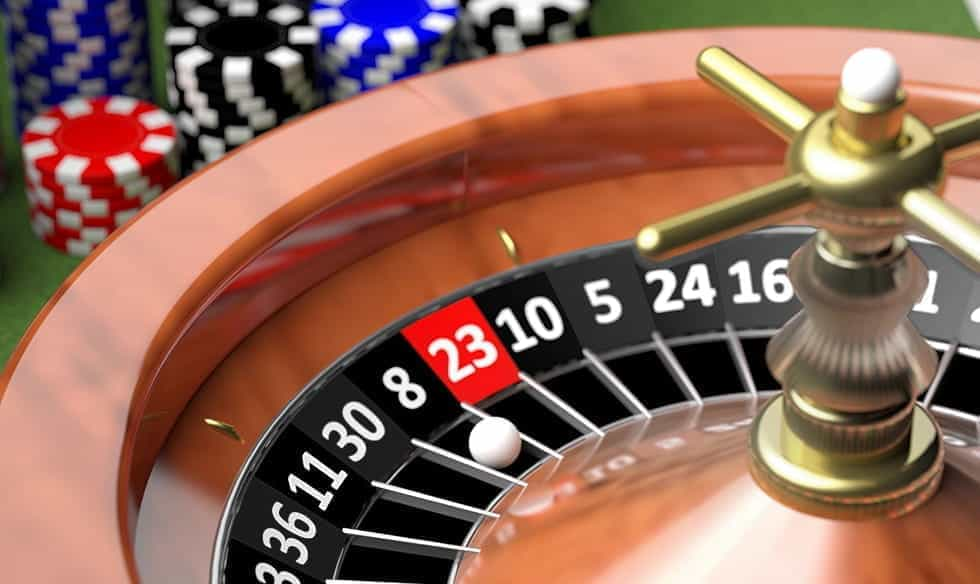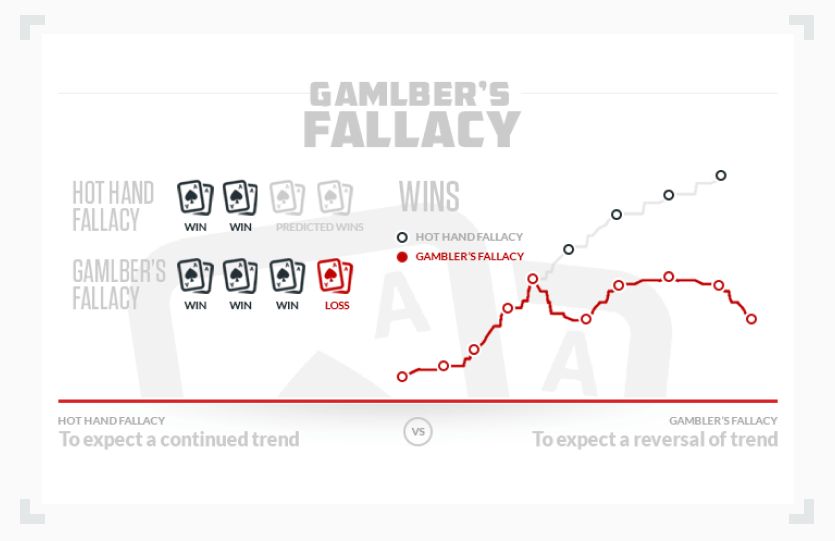Roulette Gambler Fallacy
- Roulette Gambler Fallacy Example
- Roulette Gambler Fallacy Meaning
- Roulette Gambler Fallacy Against
- Roulette Strategy Gambler's Fallacy
- Roulette Gambler Fallacy Definition
In 1913, gamblers at the Monte Carlo Casino lost millions of francs at the roulette table. The ball would land on black, and the gamblers would bet on red. The ball would land on black again, and the gamblers would continue to bet on red.

What About the Gambler’s Fallacy and the Game of Roulette? Roulette is perfect for understanding how to disprove the Gambler’s Fallacy. In fact, most roulette betting systems are products of the Gambler’s Fallacy. When you bet on a single number in roulette, you can easily calculate the probability of winning that bet.
(European roulette wheels have 37 slots: 18 red, 18 black, one green — that’s the double zero giving the house an expected return of 1/37 or 2.7%: you bet $100, on average you come away with. The Gambler's Fallacy is the misconception that something that has not happened for a long time has become 'overdue', such a coin coming up heads after a series of tails. This is part of a wider doctrine of 'the maturity of chances' that falsely assumes that each play in a game of chance is connected with other events. The gambler’s fallacy is a psychological phenomenon that’s the false belief that random events will balance each other out. Based on the “law of averages”, it is the mistaken notion that a particular outcome or event is inevitable or certain, simply because it is statistically possible. GROWING OLD UNGRACEFULLY: The Gambler’s Fallacy The night of August 18, 1913 was a good one for the owners of Le casino de Monte-Carlo in Monaco. Who am I kidding? It’s always a good night for the.
The ball landed on black 26 times in a row. The probability of that happening was 1 in 66.6 million. To this day, it’s a shocking moment in gambling history.
The 27th time, can you guess what the probability of the ball landing on black would be?
1 in 2, or 50/50.
This doesn’t seem right, but it is. And the people who would have bet on black, after the ball landing on black 26 times in a row, would still only win double what they bet.
This video is all about the Gambler’s Fallacy, and how we convince ourselves that things will “even out” on the gambling table and in other change occurrences.
What Is The Gambler’s Fallacy?
Put yourself in the gamblers at Monte Carlo’s shoes. The ball lands on black. The ball lands on black again. The ball lands on black for a third, fourth, fifth time.
At some point, you’re going to feel sure that the ball will land on red next. There’s a 50/50 chance that the ball will land on red at any given time or on black at any given time. So after a streak of the ball landing on black, you may start to think that the ball has to land on red next.
This is the gambler’s fallacy. It’s a bias in which we let past events influence our decisions and predictions about what will happen next. But this bias is based on fallacy, or a mistaken belief.

The reality of the situation is that the ball has a 50/50 chance of landing on black every single time you play roulette. Each action is independent of the actions before it. Sure, the chances of the ball landing on black 26 times in a row are way smaller than the chances of the ball landing on black twice or three times in a row, but that doesn’t mean that the ball will land on red based on those chances.
The gambler’s fallacy often leads people astray while they’re in the casino. Think of all of the people who continued to bet on red at Monte Carlo. I’m sure some of those gamblers put a lot of money on red, thinking that somehow their chances at winning big were larger just because the ball kept landing on black.
But this doesn’t just happen at the roulette table. Many people will stay at the slots for hours, believing that although they lost time after time again, their chances of winning will somehow increase.
Examples
But the gambler’s fallacy isn’t just a phenomenon that occurs within the walls of a casino. In the “real world,” this logical fallacy can have some pretty serious effects on the ways people make decisions and conduct business.
Take loans. Approving or rejecting loans can sometimes feel like a gamble to loan officers. Studies show that loan officers are more likely to reject a loan that is sitting in front of them if they had approved the last loan that came across their desk. Researchers think that 5% of loans are affected by this fallacy.
This can have a huge impact on a person’s ability to buy a house or start a business, but further research shows that this fallacy can have an even more significant impact. Asylum judges are not immune to the gambler’s fallacy. Data shows that they are more likely to approve a person’s application if they had denied the previous application, and vice versa.
Explanations
The gambler’s fallacy goes beyond how we make decisions - some argue that it affects how we make sense of the world. Remember, the gambler’s fallacy is a bias that is influenced by past events. We may link our decision to stay at the slots because of past events. But we may also explain what is happening now based on what happened in the past.
We use the gambler’s fallacy to establish patterns. We may get sick and blame it on the bread that we ate before. If we get sick a second time after eating bread, we are very likely to believe that we have an intolerance or allergy involving gluten. But connecting our stomachache to what we ate before isn’t always based in logic or correct probability. Just like connecting the ball landing on red to the ball landing on black before (or vice versa) isn’t always based in logic. Independent events are just that - independent events.
Be Aware of Gambler’s Fallacy
I’m not saying that people with stomach aches shouldn’t write off certain foods or that you should go to the casino and only bet on one color or number. But I am telling you about the gambler’s fallacy so you can be more aware of if you’re using it in your life.
Logical fallacies affect the way we make decisions, form arguments, and predict what is going to happen in the future. Since these fallacies are based on falsehoods, the results may not be so great. The more you are aware of these logical fallacies, the easier it will be for you to step back, make a proper assessment based on facts, and make better sense of what is going on around you.
Quiz
Let’s test your knowledge on the Gambler’s Fallacy.
Question 1:
A coin has been flipped 12 times. 10 of those flips have resulted in “heads.” What is the likelihood that it’s going to be tails the next time you flip it?
Roulette Gambler Fallacy Example
Answer:
50/50
Question 2:
True or False: The Gambler’s Fallacy is just limited to gamblers.
Answer:

False. Everyone is affected at some point by the Gambler’s Fallacy. It’s a common bias that all humans experience.
Last question:
The Gambler’s Fallacy is a _____ fallacy that we should be aware of when making judgements and decisions.
Answer:

Logical
Related posts:
Barry Evans / Sunday, March 1 @ 7 a.m. / Growing Old Ungracefully
GROWING OLD UNGRACEFULLY: The Gambler’s Fallacy
The night of August 18, 1913 was a good one for the owners of Le casino de Monte-Carlo in Monaco. Who am I kidding? It’s always a good night for the house. That’s why you can walk into a casino for free, you’re given about ten bucks worth of chips and a couple of drinks to loosen you up — you think they do this because they love you? (In Monaco, 1963, I walked in and walked right out after being denied entry for not wearing a jacket and tie — I don’t know if that’s still the case.)
The Monte Carlo Casino in Monaco (Fruitpunchline/Creative Commons)
Roulette Gambler Fallacy Meaning
On this particular night, someone noticed that it had been awhile since red had come up on a particular roulette wheel. So gamblers started to bet on red, reasoning that the black run couldn’t last. On average, red and black come up equally, right?

Roulette Gambler Fallacy Against
(European roulette wheels have 37 slots: 18 red, 18 black, one green — that’s the double zero giving the house an expected return of 1/37 or 2.7%: you bet $100, on average you come away with $97.30. This side of the Atlantic, casinos are greedy: roulette wheels have two greens, so your $100 returns $94.60 in the long run.)
European roulette wheel with one double zero. (Unknown photographer)
Of course, the longer the run of black lasted, the more money punters put on red and the more they lost: “It can’t go on like this, red’s got to come up soon!” It finally did, on the 27th spin. What are the odds of that happening, 26 blacks in a row? Pretty remote, which is why every gambler is familiar with this bit of folklore.
(The odds of red not coming up 26 times in a row are 1/(19/37)^26, or 1 in about 33 million. Compare that to the approximately 1 in 300 million chance that a single ticket will win a Powerball or Mega Millions lottery jackpot.)
This is as good an example of the Gambler’s Fallacy, or Monte Carlo Fallacy, as you can find: if you were there, and you’d have gone along with the crowd, you’d have fallen for it. You don’t have to go to Monaco (or even Blue Lake) to be sucked in by the fallacy, of course. Imagine tossing a (fair!) coin 10 times and it comes up heads every time. Would you bet good money that it will come up tails next time? I trust you’re smarter than that, you know the coin doesn’t have a memory. Every toss, no matter what’s gone on before, has an even chance of heads or tails. Sure, on average, the number of heads will be approximately equal to the number of tails — and the more tosses, the closer it’ll be to a 50/50 ratio.
Hence casinos. They don’t deal in chump change, one sucker at a time. They deal with the sum of thousands and millions of individual bets over the course of months and years. The one lucky punter who comes out ahead by ten grand is balanced by the other 99 who’ve lost a hundred or so. Every serious gambler knows this, of course, which is why they play poker — not fixed-odds slots or roulette — where skill is more important than luck.
Whatever you’re playing, you know there’s something more attractive and alluring than making money, right? You’re there for the sheer fun of taking risks.
Roulette Strategy Gambler's Fallacy
Win or lose, the real pay-off is the adrenaline rush.